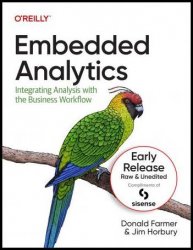 Название: Embedded Analytics: Integrating Analysis with the Business Workflow (3rd Early Release)
Название: Embedded Analytics: Integrating Analysis with the Business Workflow (3rd Early Release)Автор: Donald Farmer, Jim Horbury
Издательство: O’Reilly Media, Inc.
Год: 2023-01-04
Язык: английский
Формат: epub, mobi
Размер: 10.2 MB
Over the past 10 years, data analytics and data visualization have become essential components of an enterprise information strategy. And yet, the adoption of data analytics has remained remarkably static, reaching no more than 30% of potential users. This book explores the most important techniques for taking that adoption further: embedding analytics into the workflow of our everyday operations.
Author Donald Farmer, principal of TreeHive Strategy, shows business users how to improve decision-making without becoming analytic specialists. You'll explore different techniques for exchanging data, insights, and events between analytic platforms and hosting applications. You'll also examine issues including data governance and regulatory compliance and learn best practices for deploying and managing embedded analytics at scale.
Most of us are familiar today with Business Intelligence (BI). At one time, it was a new and exciting capability, but now, thanks to self-service technologies, the cloud and the power of in-memory processing, richly featured analytic applications, data visualisations, reports and dashboards are available to almost any business user who wants wants them.
However, each of these capabilities typically depend on separate applications. To perform business analysis, you need to open your BI suite. If you want to create a special charting, you may a look to a data visualisation application. Embedded analytics takes a somewhat different approach. The aim of embedding is to integrate visualisations, dashboards, reports and even predictive analytics or Artificial Intelligence (AI) capabilities inside your everyday business applications. So if you are managing a production line, preparing a budget or reviewing HR issues you can have analytic insights ready to hand to guide you.
Another source of data for an embedded system may be the output of a data integration pipeline. That is to say, rather than reading data from a table in an in-memory system or a data warehouse or an operational database, that data will be read from a pipeline running in a data science environment. The pipeline may perform numerous operations of integration, cleansing and preparation on the data from whatever source it comes. This is a very popular scenario for data science. But it is limited in use for embedded analytics, because the process is a little more fragile and a little more difficult to govern than a data warehouse or an in-memory system. This is because the pipeline is more dynamic and more volatile, only delivering data while it is running.
Learn how data analytics improves business decision-making and performance
Explore advantages and disadvantages of different embedded analytics platforms
Develop a strategy for embedded analytics in an organization or product
Define the architecture of an embedded solution
Select vendors, platforms, and tools to implement your architecture
Hire or train developers and architects to build the embedded solutions you need
Understand how embedded analytics interact with traditional analytics
Скачать Embedded Analytics (3rd Early Release)
[related-news] [/related-news]
Комментарии 0
Комментариев пока нет. Стань первым!















